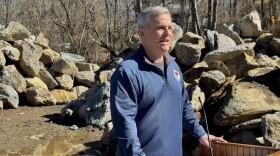If it had been up to a group of western North Carolina voters, former Congressman Madison Cawthorn never would have been allowed to seek re-election last year.
The group, backed by a Boston-area nonprofit organization — Free Speech for People — filed a challenge with the North Carolina State Board of Elections and the case ended up going from federal district court to the Fourth Circuit Court of Appeals.
The central argument was that Cawthorn's participation in a pro-Trump rally in Washington, D.C., on Jan. 6, 2021, and his support for efforts to overturn the 2020 presidential election disqualified him from running for office.
The challenge against Cawthorn hinged on Section 3 of the U.S. Constitution's 14th Amendment, a post-Civil War provision that bars officials who have previously sworn to uphold the Constitution from serving in government office if they have engaged in a rebellion or insurrection.
It is the same argument being made against Donald Trump in cases being heard in courts in Colorado, Minnesota and Michigan. The current cases seek to block state elections officials from including Trump on presidential primary ballots in 2024.
Did actions on Jan. 6 constitute engaging in a rebellion?

Like Cawthorn, Trump appeared at the rally on Jan. 6, 2021, and exhorted the crowd, using various words, to stop certification of the 2020 election they falsely portrayed as a stolen.
"Our country has had enough," Trump told the cheering crowd on that day. "And we will not take it anymore and that's what this is all about."
And just minutes earlier, on that same stage, Cawthorn — then a first-term Congressman representing North Carolina's 11th District — had vowed to the fired-up crowd that "we will be contesting the election."
Courts will now contend with thorny legal questions, such as what actually constitutes a rebellion and whether Congress needs to make that clearer through legislation before courts can weigh in, according to Professor Derek Muller, an elections law expert at the University of Notre Dame in South Bend, Indiana.
Muller said another major issue to settle in the current candidate challenges against the former president is whether Trump actually engaged in rebellion.
"Is it protected by the First Amendment, is it free speech?" Muller asked, referring to Trump's comments on Jan. 6. "Is it just words of exhortation or is it something that actually incited a crowd to violence?"
And, Muller added, there is a question as to whether the constitutional provision even applies to a former president because that office is not specifically mentioned in the clause's language.
Muller said the Cawthorn case helped clarify what issues the parties in the cases against Trump should prepare to argue. In Cawthorn's case, for example, a Trump-appointed federal district court judge had said the challenge should be dismissed because Cawthorn was covered by an 1872 amnesty law meant to clear former members of the Confederacy.
But Muller notes the federal Fourth Circuit Court of Appeals disagreed that amnesty act applied to Cawthorn and, presumably, other alleged insurrectionists like Trump.
"So, you're not seeing arguments like that, you know, that were raised then, being raised here," Muller said.
Case is likely headed to the U.S. Supreme Court

With the potential for conflicting outcomes in different states, it is likely these issues could end up in front of the U.S. Supreme Court. But, according to University of Baltimore Professor Kim Wehle, that doesn't mean the justices will take up the case.
"The court could say, 'Listen, this is a political question,' which is sort of a way out, frankly," said Wehle, who teaches constitutional law.
In other words, it could be left to the voters to decide whether Trump is qualified for office. Just like voters in Cawthorn's western North Carolina district did last year.
Cawthorn lost his 2022 GOP primary to current U.S. Rep. Chuck Edwards, leaving the legal questions about his eligibility for office unresolved.







